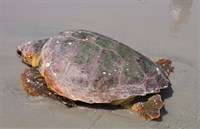
We’ve already admitted four turtles that took a chance on a tasty bite of squid and got more than they bargained for, and it’s often the Kemp’s who are notorious opportunists. Luckily, we’re rather good at de-hooking turtles as long as they haven’t swallowed the whole rig along with their lunch. In that case, we transport them to our turtle vet, Dr. Harms up at CMAST for specialized care.
Finding a sea turtle at the end of your line when you’re expecting a nice blue or mackerel can be alarming. But there are a few steps you can take to make sure that you and the turtle can get safely through the event, and our local piers are well trained in assisting you in the recovery. Sea turtles are wild animals and are very strong even out of the water so be mindful of their front flippers and jaws.
The best way to handle a hooked turtle is by reeling it in slowly, keeping its head above water, then using a large net to bring them up onto the pier or beach. Do not yank on the line and haul it through the air and onto the pier, all the while banging against the pilings and rails. This could turn a minor injury in to a life-threatening one. Once you have the turtle out of the water and under control cut the line no shorter than a foot from the hook and secure it to the turtle (using tape if possible) to prevent the turtle from swallowing it. Notify the pier operator who will call us for retrieval and follow-up care at our hospital.
It’s a good idea to let us check out any turtle no matter how minor the hooking might appear. Often turtles who hang around piers do so because they are debilitated in some way and it’s an easy source of food. It may not be the first hook they have mistaken for food and only a radiograph will confirm that. In most cases hooked turtles are quickly released after a night or two at our bed and breakfast. On April 27t e admitted a 98-lbs. loggerhead that had a large, stainless-steel hook embedded in her jaw. “Carnation Pink” quickly recovered and was released in Surf City a few days later to the delight of visitors who just happened to be around at the time.
During May we will be open for tours on Thursday, Friday and Saturday from 11 AM – 1 PM. Tickets MUST be purchased in advance through our website: www.seaturtlehospital.org. Select the date, time, and the number of guests in your party and purchase your tickets. We limit the number of guests for each time to make the experience more enjoyable and to continue our commitment to keep you and our staff safe as we work our way through Covid. At this point, masks are not required. Sorry, but we are not able to accommodate walk-ups for tours once we sell out for the day. Please keep in mind that traffic can be especially heavy on the weekends so plan your arrival accordingly. If you are coming only to our gift shop (not for a tour) you can enter through the single door to the left of the main entrance.
Nesting season has officially arrived, and our Topsail Turtle Project volunteers are out on the beaches before sunrise looking for signs that mama has nested. We usually see our first confirmed nest around Mother’s Day so keep your eyes peeled. If you spot anything unusual such as a stranding or nesting, please call our Director of Beach Operations, Terry Meyer at: 910-470-2880. If she is not available, you may call the hospital during operating hours: 910-329-0222. We will take the information and we will send a trained volunteer to meet you to assess the situation. The State of NC hotline for stranded, sick, and injured turtles is 252-241-7367. The state number picks up 24/7. Please note that all our work with sea turtles, at the hospital and on the beach, is authorized by the NC Wildlife Resources Commission, ES Permit 22ST05.



